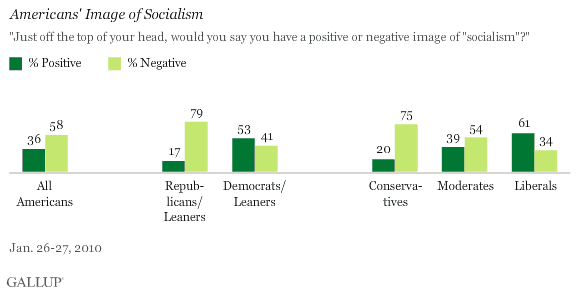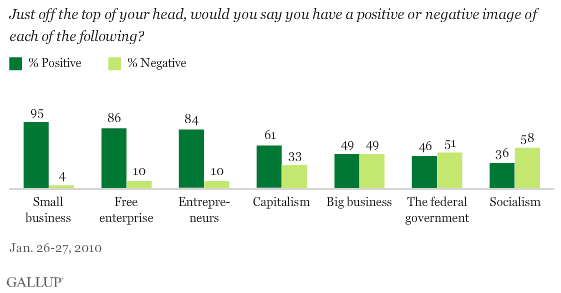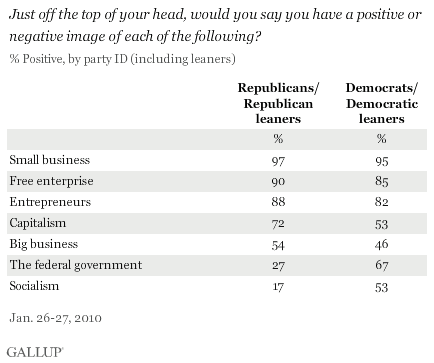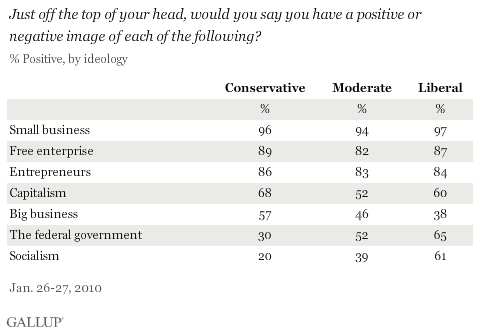PRINCETON, NJ -- More than one-third of Americans (36%) have a positive image of "socialism," while 58% have a negative image. Views differ by party and ideology, with a majority of Democrats and liberals saying they have a positive view of socialism, compared to a minority of Republicans and conservatives.

"Democrats and Republicans agree in their ratings of several of the terms, but differ significantly in their ratings of others -- in particular, capitalism, the federal government, and socialism."
"Socialism" was one of seven terms included in a Jan. 26-27 Gallup poll. Americans were asked to indicate whether their top-of-mind reactions to each were positive or negative. Respondents were not given explanations or descriptions of the terms.
Americans are almost uniformly positive in their reactions to three terms: small business, free enterprise, and entrepreneurs. They are divided on big business and the federal government, with roughly as many Americans saying their view is positive as say it is negative. Americans are more positive than negative on capitalism (61% versus 33%) and more negative than positive on socialism (36% to 58%).

Democrats and Republicans agree in their ratings of several of the terms, but differ significantly in their ratings of others -- in particular, capitalism, the federal government, and socialism.

In similar fashion, there is little distinction across ideological groups -- conservatives, moderates, and liberals -- in the ratings of several of these terms, but more significant differences in response to others, such as big business, the federal government, and socialism.

These differences will be discussed in the sections that follow.
Socialism
Socialism had the lowest percentage positive rating and the highest negative rating of any term tested. Still, more than a third of Americans say they have a positive image of socialism.
Exactly how Americans define "socialism" or what exactly they think of when they hear the word is not known. The research simply measures Americans' reactions when a survey interviewer reads the word to them -- an exercise that helps shed light on connotations associated with this frequently used term.
There are significant differences in reactions to "socialism" across ideological and partisan groups:
-
A majority of 53% of Democrats have a positive image of socialism, compared to 17% of Republicans.
-
Sixty-one percent of liberals say their image of socialism is positive, compared to 39% of moderates and 20% of conservatives.
Capitalism
"Capitalism," the word typically used to describe the United States' prevailing economic system, generates positive ratings from a majority of Americans, with a third saying their reaction is negative.
As was the case with "socialism," there are differences across population segments.
-
Republicans are significantly more positive than Democrats in their reactions to "capitalism," although majorities of both groups have favorable opinions.
-
Opinions of the word by ideology are divided in an unusual, though modest, way. Conservatives have the highest positive image, followed by liberals. Moderates have somewhat lower positive ratings than either of these groups.
One might expect those with negative attitudes toward capitalism to be more likely than others to have positive attitudes toward socialism. That is indeed the case, but the difference in positive attitudes toward socialism between those with positive and those with negative attitudes toward capitalism is fairly modest: 33% vs. 43%, respectively.
Free Enterprise
Eighty-six percent of respondents rated the term "free enterprise" positively, giving it substantially more positive ratings than "capitalism." Although in theory these two concepts are not precisely the same, they are in many ways functional equivalents. Yet, underscoring the conventional wisdom that words matter, the public clearly reacts differently to the two terms. Free enterprise as a concept rings more positively to the average American than does the term capitalism.
Strongly positive ratings of free enterprise are generally uniform across both partisan groups, and across the three ideological groups.
Small Business and Big Business
"Small business" is the most positively rated term of the seven included in the list, with a nearly universal positive rating of 95%.
In contrast, Americans were sharply divided when asked to react to the term "big business," with 49% of respondents rating the term positively and 49% negatively.
This contrast in images, based on whether the adjective "small" or "big" is placed in front of "business," confirms a number of previous Gallup findings. Americans have a strong tendency to react positively to "small" and negatively to "big" when it describes business entities.
There is remarkably little difference between Republicans and Democrats in their ratings of the images of small and big business. Both partisan groups are overwhelmingly positive about the former, and roughly half of both partisan groups rate the latter positively. The finding that Democrats and Republicans have roughly equal reactions to big business is significant given the usual assumption that Republicans are more sympathetic to large businesses and corporations than are Democrats. These data do not confirm that hypothesis at the rank-and-file level.
All three ideological groups rate small business very positively.
Big business is rated positively by 57% of conservatives. Less than half of both moderates (46%) and liberals (38%) have positive images of big business.
Entrepreneurs
Because "entrepreneurs" are usually by definition associated with start-ups of small businesses, it is not unexpected to find that the term generates nearly the same level of positive reaction as did the term small business.
And, as was the case for small business, there is little distinction in ratings of entrepreneurs across partisan or ideological groups.
The Federal Government
Americans' reactions to the term "the federal government" are similar to those for "big business," with about half rating the term positively and half negatively. However, while there are only minimal partisan differences in reactions to "big business," there are substantial differences in reactions to the federal government, which may reflect the current partisan control of the White House and Congress.
-
Democrats are much more positive about the federal government than are Republicans.
-
Liberals are over twice as likely as conservatives to have a positive image of the federal government, with reactions of moderates in between those of these two groups.
Bottom Line
As most politicians and many in business have learned, the choice of words to describe a concept or a policy can often make a substantial difference in the public's reaction. The current research confirms that assumption.
"Socialism" is not a completely negative term in today's America. About a third of Americans respond positively when they hear the term. Some of this reaction may reflect unusual or unclear understandings of what socialism means. Reaction to the term is not random, however, as attested by the finding that positive images are significantly differentiated by politics and ideology.
It is apparent that "free enterprise" evokes more positive responses than "capitalism," despite the apparent similarity between the two terms.
President Barack Obama made frequent positive references to small business in his recent State of the Union address, perhaps aware of the very positive associations Americans have with that term. In particular, this research underscores the fact that Americans' image of business can vary substantially, depending on whether it is described as small or big. Along these same lines, it is perhaps not surprising to find that entrepreneurs are held in high esteem by Americans.
The finding that Americans have mixed reactions to the term "the federal government" is not new. Much previous research has shown that at this point in history, a majority of Americans are not enamored with the federal government, particularly the legislative branch.
Survey Methods
Results are based on telephone interviews with 972 national adults, aged 18 and older, conducted Jan. 26-27, 2010. For results based on the total sample of national adults, one can say with 95% confidence that the maximum margin of error is ±4 percentage points.
Interviews are conducted with respondents on land-line telephones and cellular phones.
In addition to sampling error, question wording and practical difficulties in conducting surveys can introduce error or bias into the findings of public opinion polls.
